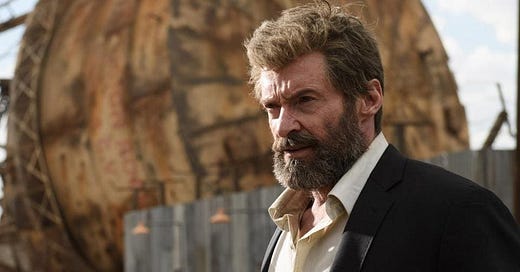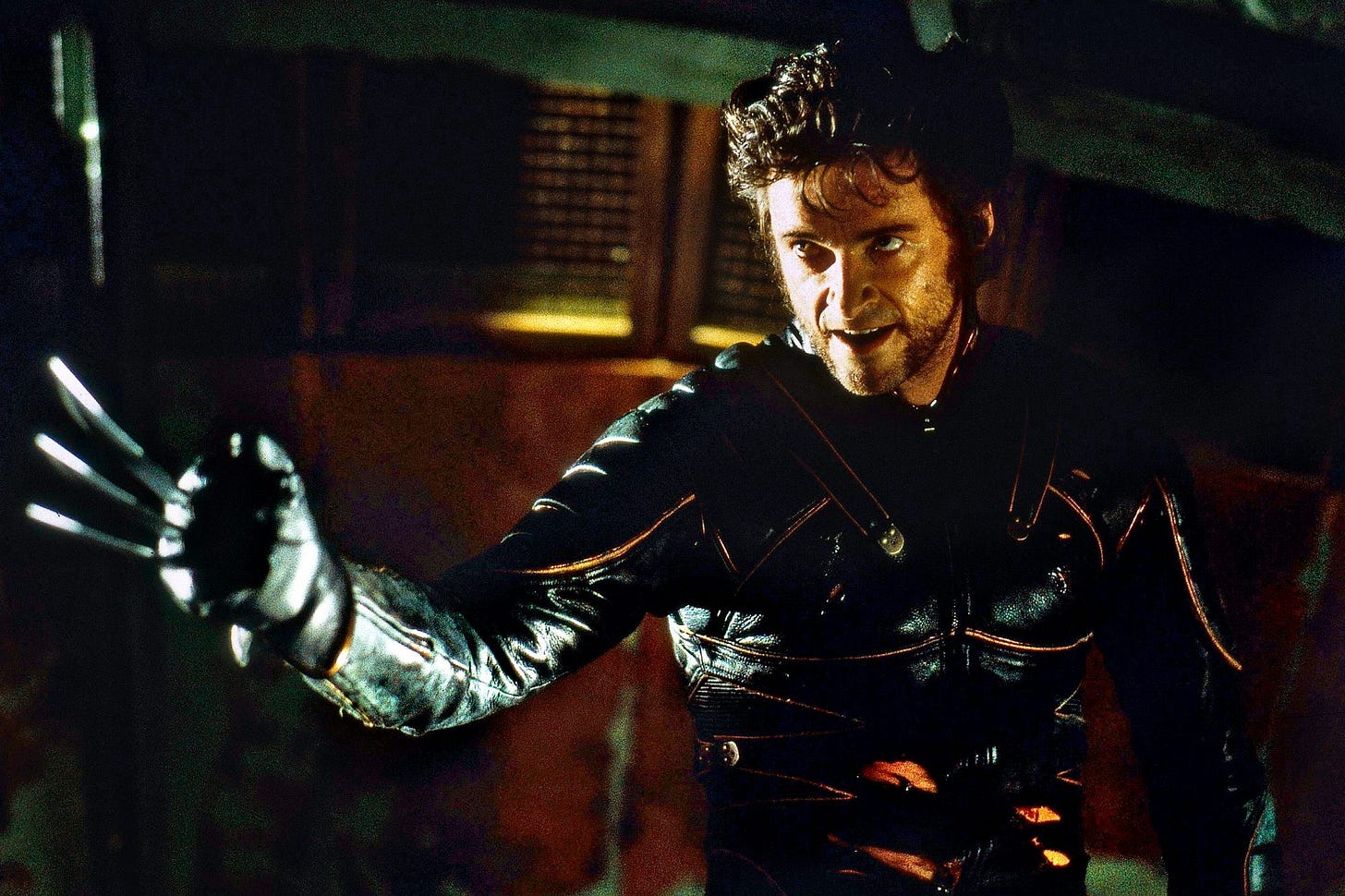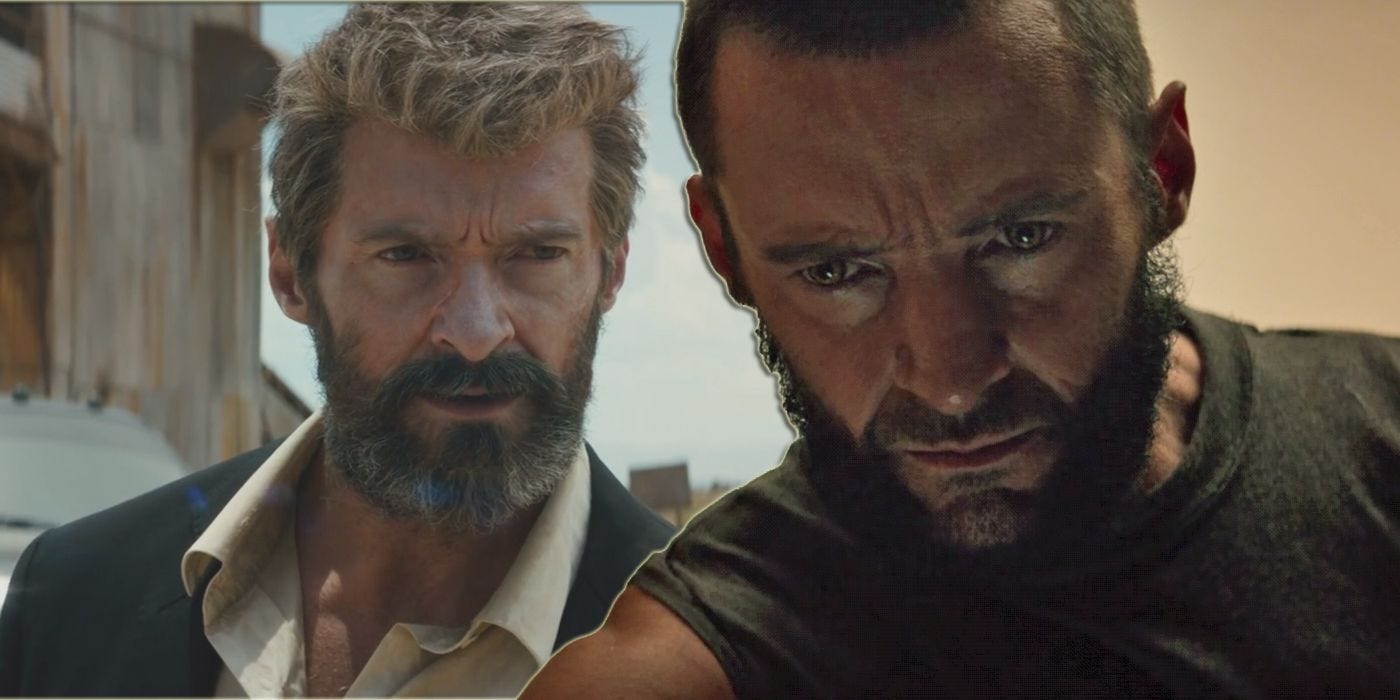Logan: The only superhero movie worth saving
Dark and profound meditations on the redemptive power of fatherhood
Most superhero movies are not very good, and they have only gotten worse over time; Logan, released five years ago, may be the only truly worthwhile superhero film made in the last 25 years, in part because it eschews most of the lame conventions of superhero movies in favor of something much richer and more gratifying.
Superhero movies mostly suck for a variety of reasons, and chief among them is that it is almost impossible to relate to anyone or anything in them. About 65% of a modern superhero movie is just trashy, high-budget-but-low-energy CGI battles, 25% is a bunch of stupid banter between the ensemble cast, and 10% is somebody crying while watching someone else get dissolved by an atomic refractor ray or absorbed into a trans-dimensional chryon mist or something. None of it has anything to do with your life, it’s all rote, it’s just really awful and boring.
Logan is a different sort of film. The irony, of course, is that Logan would likely not be the remarkable film it was if Marvel hadn’t spent two decades and two billion bucks setting the stage for it with a long series of lesser, dumber movies. Or maybe it would be just as good without all that, I don’t know. After 20 years of this dead-eyed cinematic zeitgeist, it can be hard to tell.
Logan is about James Howlett, aka Logan, aka the mutant Wolverine, who after multiple films and a confusing foray into a cross-dimensional alternate timeline finds himself among the last mutants in the world, caring for an aged and infirm Professor Charles Xavier in the middle of the Mexican dessert and driving drunk bachelorette parties around El Paso to make a few bucks. His last remaining ambition is to get enough money to buy a boat so that he and Professor X can sail away to some sort of pastiche of freedom, in part that they might be far away from other people so that Xavier’s periodic psychic breakdowns can’t hurt anyone else.
Things get derailed when a little girl, Laura, shows up at their low estate; it turns out that she is a mutant, created from Logan’s DNA—in effect, his daughter—and she is being pursued by corporate bad guys who want to destroy her for the incriminating piece of evidence she obviously is. Needless to say, Logan and Xavier are drawn into the conflict, eventually agreeing to transport Laura to the Canadian border where a group of her mutant friends are supposedly waiting for her.
Logan is exceptionally violent—it is not merely the most violent superhero movie you’re likely to see, its’s among the most violent films you’re apt to watch. It is also exceptionally grim and grave and doleful: Logan, at the end of his life, is a bitter, alcoholic, angry, lonely, isolated loser, his life’s previous accomplishments meaningless and of no use to him, his entire world more or less one of what Theodore Dalrymple called "the eternal present,” Logan himself without “cultural or historical connection to [his] own past” and with a future of no real value before him.
Unsurprisingly, Laura’s arrival changes all of that, though not in the way you might think. Logan never truly warms up to his daughter, at least not in a traditionally cinematic way; at first he wants nothing to do with her, then he grows to more or less resent her for the chaos she has injected into his life, and at one point he nearly abandons her. He is not an antihero so much as he is merely a morose, unpleasant, drunken malcontent, ever gravitating toward the useless consolation of being completely alone.
Yet he nevertheless manages to drag himself into a comprehensive sort of fatherhood, one in which he sacrifices all his own wants and desires and intentions for that of his child. Fatherhood movies—good and bad, meaningful and trite, fresh and worn—are a dime a dozen throughout the decades; Logan’s unique approach to the genre is that it deals almost entirely with fatherhood by way of what is arguably the defining feature of male authority: That fathers—that men—are physically stronger and more powerful and more aggressive than women and children, and that the best fathers are those who learn to channel those particular charisms into good causes rather than bad ones, which Logan ultimately does.
Logan, as an X-Men, has of course spent his life fighting for good, at least as it’s often comically defined within the narrow bounds of Marvel comic book movies. But he has never really had to be good at human scale; he has never had to take on the responsibility of a caregiver, up to and including making sure a rather difficult little child has enough to eat and a place to sleep and protection from bad people. The special secret to Logan, then, is its wildly different approach to both saving, and salvation, relative to other superhero movies: Logan in this movie is not in the business of saving the world but of saving a single specific person within it, which is far more of a relatable experience than, you know, flying around in a supersonic ship in a leather jumpsuit.
Logan himself is largely made up of primal urges, but in his zeal to protect and defend his daughter he finds an urge even more primal and relentless than the hairy, cigar-chomping, adamantium-fueled hijinx that have driven him for most of his life as an X-Man. Indeed, at the climax of the movie his desire to save his little girl’s life is so strong that he quite literally turns away from a life of shallow material comfort, ruins his own body, and dies. Ask any parent if they’d be willing to do the same if it came to that; if they say no, excise them from your friend group immediately. This is the nature of the business—it’s what you have to be prepared for, even if it never comes to it.
The Wolverine’s death itself is, in its own inverse way, an indictment on the shortcomings of the childless, selfish life that is increasingly mainstream in modern America—a culture that is obsessed with the youthful and contemptuous of actual youth. Logan’s ultimate antagonist in the film is another mutant, a genetically engineered super-soldier that is effectively a much younger version of Logan himself, the Wolverine in his prime, albeit a cartoonishly strong and aggressive one, with no humanity and no ability to be reasoned with.
Logan’s ultimate conflict, then, is ostensibly not so much against an external villain as a set of internal compulsions driven by a selfish and destructive youth. The younger man, consumed by effective purposelessness and stupid anger, comes very close to overwhelming and obliterating the older man of substance and meaning. It is no small amount of poignancy that the ultimate destroyer of this broad-chested malefic force is not Logan himself but his daughter—it is Logan’s child who finally extinguishes that particular threat, and allows Logan to become fully actualized as a parent, if only for a few moments.
It is worth pointing out that Logan’s function as a father is not just one of physical protector; in the brief time he spends with his daughter he manages, in his own gruff way, to impart some sense of morality upon her, or at least try to. At one point near the end of their adventures they speak:
Logan: I hurt people. …
Laura: I've hurt people too.
Logan: You're gonna have to learn how to live with that.
Laura: They were bad people.
Logan: All the same.
Here, after a few decades of plunging his claws through about 4500 different hearts, Logan lets it slip that even righteous violence carries with it a tremendous burden: Even killing “bad people” takes something out of you, lessens you, diminishes you in some way. Logan, or at least his 20th Century Fox iteration, has never been what you would call a reflective or philosophical wolf-man; he has mostly just killed people, more or less justifiably but apparently without thinking about it too much.
Now we see that he has shouldered a considerable weight for all of those killings, and it is not a mistake that it is his daughter who brings this recognition out in him. Logan admits, however tacitly, that human life is intrinsically valuable, that it is not meaningless, and that the things you do to other people are of tremendous consequence and must be considered very carefully before they are done. These are lightning-bolt revelations, the sorts of things that many people either never figure out or just deny altogether. One way to stumble across this knowledge, I guess, is to kill a bunch of bad guys for a great many years and then reflect on it in your old age. The other is to have a child, and to witness the congenital value of human life in its pure and undiluted form. Logan gives voice to one of the great realizations of parenthood, which is that life matters—that lives matter—and that we must never forget it, not even for a second.
Logan is a very fine film on its own merits, but as a superhero movie—and indeed as a movie in what is effectively an era of deep cinematic drought, where 90% of movies are either reboots or trash entries into various “cinematic universes”—it is superlative. It is not a pat, clean, pretty sort of movie made for marketing tie-ins and Super Bowl brand endorsements; it’s much simpler and uglier than any of that would allow. It’s a movie about a very broken family trying to find happiness and redemption against considerable odds; it’s a very common story, in other words, at least at an elemental level.
And like so many families, it is in the end the child who, simply by her nature, gives galvanizing purpose to the whole endeavor—it is the child who makes the family, and the family, of course, was designed to save:
Laura: You are dying. You want to die.
Logan: How do you know?
Laura: Charles told me.
Logan: What else did he tell you?
Laura: To not let you.
This exchange can be a bit misleading and should be construed properly. Charles did not tell Laura to “not let Logan die;” she is ultimately powerless to prevent that and Charles would have known it. Rather, he told her to “not let Logan want to die.” In that she succeeds: In creating new life, Logan gives himself new life, and a new desire for it—he makes purpose and order where before there was neither, taking part with God in the great act of creation and properly fulfilling his role within that divinely ordered system. For all the times he saved the world, his greatest accomplishment was being a father and saving his child. He was, in the end, a good dad. That is enough.








